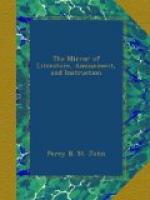There are three Engravings—a stunted Frontispiece from Wouverman’s Hawking Party, a Plan of Olympia, and the Tomb of Scaurus—the two latter belonging, to use Mr. Smith’s words, rather to “learned lore and antiquarian pedantry,” than a book of popular interest. Even had Mr. Smith selected cuts of the Archery Meeting at Harrow, or the Staffordshire Morris Dance Window, he would better have consulted the gratification of his readers. In short, there are few subjects that admit of more delightful illustration, literary or graphic, than the “Festivals, Games, and Amusements” of “Merry England;” yet, to do these topics justice, requires careful compilation, condensation, and tasteful arrangement, upon neither of which points can we congratulate Mr. Smith’s judgment in the specimen before us. Probably the author has been so long accustomed to indulge his fancy in ten shilling volumes of “historical tales,” that he finds it difficult to restrain himself to books of facts: if this be the case, we should say that Mr. Smith is not just the person to furnish the “nation” with a history of “Festivals, Games, and Amusements, Ancient and Modern.”
[4] See Mirror, vol. xiii. p. 259.
* * * * *
LORD BYRON.
(From Moore’s “Life," Vol. II.)
To those who have, from his childhood, traced him through these pages, it must be manifest, I think, that Lord Byron was not formed to be long-lived.—Whether from any hereditary defect in his organization—as he himself, from the circumstance of both his parents having died young, concluded—or from those violent means he so early took to counteract the natural tendency of his habit, and reduce himself to thinness, he was, almost every year, as we have seen, subject to attacks of indisposition, by more than one of which his life was seriously endangered. The capricious course which he at all times pursued respecting diet—his long fastings, his expedients for the allayment of hunger, his occasional excesses in the most unwholesome food, and, during the latter part of his residence in Italy, his indulgence in the use of spirituous beverages—all this could not be otherwise than hurtful and undermining to his health; while his constant recourse to medicine—daily, as it appears, and in large quantities—both evinced, and, no doubt, increased the derangement of his digestion. When to all this we add the wasteful wear of spirits and strength from the slow corrosion of sensibility, the warfare of the passions, and the workings of a mind that allowed itself no sabbath, it is not to be wondered at that the vital principle in him should so soon have burnt out, or that, at the age of thirty-three, he should have had—as he himself drearily expresses it—“an old feel.” To feed the flame, the all-absorbing flame, of his genius, the whole powers of his nature, physical as well as moral, were sacrificed;—to present that grand and costly conflagration to the world’s eyes, in which,




